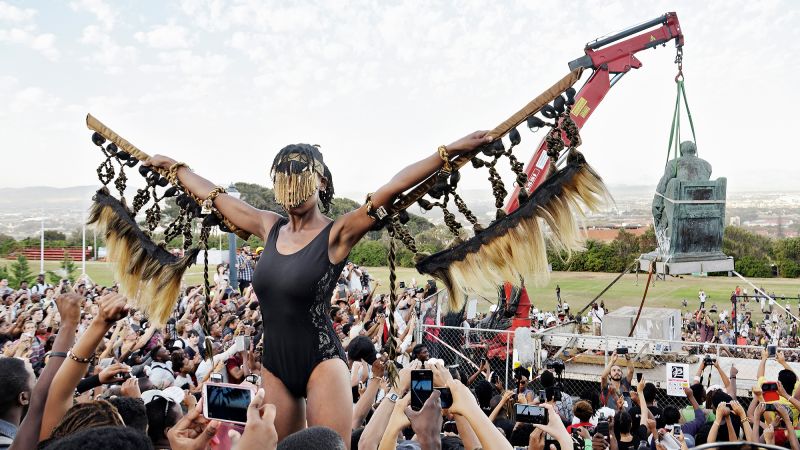
Inspired by a dream, this photograph became a symbol for a transformative protest movement
CNN
Nine years ago, this artist stepped onto a plinth in a black body suit and stiletto heels, her arms adorned with wings fashioned out of wood, velvet, and hair.
Nine years ago, Sethembile Msezane stepped on top of a plinth, wearing a black body suit and stiletto heels, her arms adorned with wings she fashioned out of wood, velvet, and hair. Behind her, a statue of a man can be seen being lifted in the air. “Chapungu — The Day Rhodes Fell” has since become an iconic photograph, capturing the spirit of the #RhodesMustFall movement which led to the removal of 19th century colonist Cecil Rhodes’ statue at the University of Cape Town. Msezane was a studying for a Master’s degree in Fine Arts at the university during the protests, which saw students call for the Briton’s statue to come down, citing his legacy as being tainted with racism. “There is no way I could have conceptualized that moment and the way things unfolded on that day,” said Msezane, speaking to CNN from Cape Town. Her performance, and the resulting image — which has come to serve as a symbol for the historic day — was born from a recurring dream that haunted her around the time the protest movement began. The dreams centred around “Chapungu,” a sacred Zimbabwean bateleur eagle who Msezane embodied atop the plinth with her wings. Eight of the birds — which hold great spiritual value for the people of Zimbabwe — were immortalised in green-gray soapstone in the ancient city of Great Zimbabwe. As the site fell into disrepair, six were subsequently looted, and in the 1800s, one statue of Chapungu was given to Cecil Rhodes. While several have now been returned, to this day, it remains at Rhodes’ former home at the Groote Shuur estate in Cape Town, Msezane explained. “There have been political calls for her to return home, but for some reason, these calls have been denied,” she said. “There is a mythological belief that until she is returned home, there will be social unrest in Zimbabwe.”





















 Run 3 Space | Play Space Running Game
Run 3 Space | Play Space Running Game Traffic Jam 3D | Online Racing Game
Traffic Jam 3D | Online Racing Game Duck Hunt | Play Old Classic Game
Duck Hunt | Play Old Classic Game